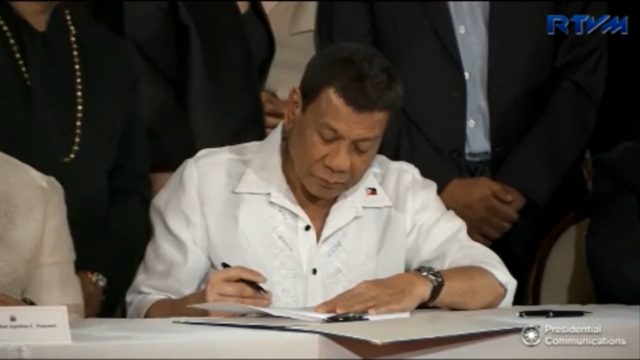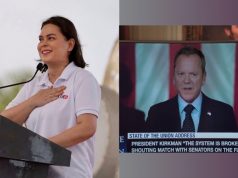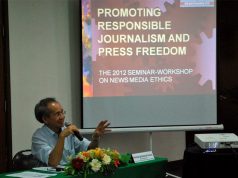President Rodrigo Duterte signed into law the bill granting him special powers to address COVID-19 health crisis late Tuesday.
The law called the Bayanihan to Heal as One Act (RA 11469) also placed the country under a state of emergency effective for three months unless extended.
The House of Representatives and Senate approved their own versions in a 17-hour special Congress session on Monday.
They deliberated three bills including the Malacañang draft called the Bayanihan Act of 2020. This draft shared by reporters last Sunday contained a number of provisions that worried some Filipinos and members of the legal community.
The provisions opposed by the public include the “emergency powers,” and the take over of private establishments and public utilities, and realigning funds from the 2020 national budget.
The reported version that the Senate passed on the third and final reading with a 12-0 plenary vote past midnight of Tuesday already had these provisions amended.
The eight other senators including expressed their position only via phone patch and were not counted.
The amendments were then adopted by the House of Representatives before it was finally submitted to the president for signing.
Potential pros and cons of the law
While some perceived the Bayanihan to Heal as One act to be financially beneficial to the public, some activists expressed worry on Duterte’s power over the budget allocation.
“Duterte, who has a history of allowing and composing anti-people policies, has now full control of the overall budget allocated for COVID-19,” progressive group Anakbayan UST said.
On Thursday, former presidential spokesperson Abigail Valte tweeted the salient points from the new law.
One of the guidelines indicated that the presidential has additional powers to:
- All unutlized and unleased portions of the Special Purspose Fund and
- All cash, funds and investments, including utilized unreleased subsidies and transfers held by Government-Owned and Controlled Corporations
Another provision prohibiting spread of false information on COVID-19 crisis on social media and other platforms also raised concerns on limitation of freedom of speech.
This provision indicated in Section 6 of the law was added to the adopted bill last minute before it was submitted to Duterte.
It states that “individuals or groups creating, perpetuating, or spreading false information regarding the COVID-19 crisis on social media and other platforms, such information having no valid or beneficial effect on the population, and are clearly geared to promote chaos, panic, anarchy, fear, or confusion” may be penalized.
The law states that those who will violate this provision may be punished by “imprisonment of two (2) months or a fine of not less than Ten Thousand Pesos but not more than One Million Pesos, or both such imprisonment and fine, at the discretion of the court.”
The National Union of Journalists of the Philippines perceived this as a threat to the freedom of expression.
“While we acknowledge the need to fight discrimination in this time of crisis, we fear the Bayanihan We Heal as One Act will only end up criminalizing free speech. We assert that the best way to fight disinformation is through education and the truth,” the NUJP said.
“In times of crisis, when the swift delivery of accurate information to our people is vital, we need more, not less, independent reporting,” it added.
[Statement] “Fake news” provision threatens freedom of the press, expression pic.twitter.com/llsomjvAZY
— NUJP (@nujp) March 26, 2020










